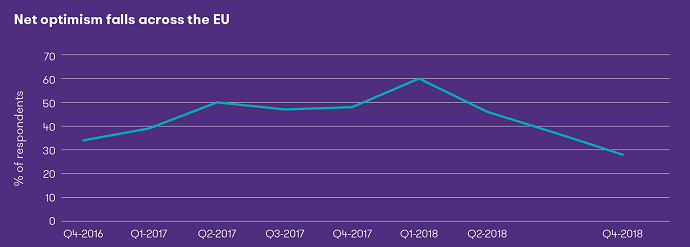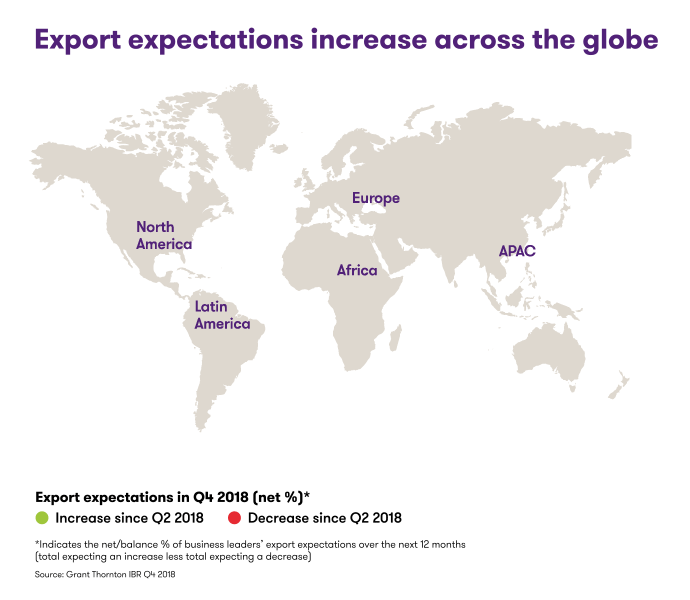European businesses are battening down the hatches in the face of swirling uncertainty, but leaders shouldn’t just sit back and wait for a clearer picture.
There are still growth opportunities in the market for those adopting the right strategies.
There is no shortage of uncertainty in Europe, both economic and political. Brexit, weak export demand from China, growing populist politics ahead of EU parliamentary elections and an economic cycle that has passed its peak are conspiring to erode confidence.
In fact, Grant Thornton’s latest International Business Report (IBR) found that net economic optimism among EU business leaders – the percentage of optimists minus pessimists – fell by 18pp to 28% since Q2 2018. In eastern Europe, net optimism turned negative (-10%), plunging from 20%.
While the uncertainties are real, and businesses are right to be concerned, it’s important to remember that there are still significant market opportunities for businesses, if they can adjust their strategies to deal with obstacles and exploit opportunities.
Larissa Keijzer, region head Europe, at Grant Thornton International, says: “While the future remains unclear, European businesses with the best understanding of potential outcomes and the right strategies will outperform the competition.”
Uncertainty has impacted Europe to different degrees
Each country’s economy – and business community – has been impacted to differing extents by the uncertainties. In the UK, with fears over a disorderly, no-deal Brexit mounting, net optimism slid to 9%, the lowest level since Q3 2017 IBR. In Ireland, the latest AIB Business Sentiment Index revealed 35% of smaller businesses in the country had cancelled or postponed investment plans due to Brexit.

Actual and forecasted changes to economic estimates are contributing to worries. The European Commission cut its growth forecasts for Ireland to 4.1% this year, down from 4.5%, citing Brexit. With Ireland very much on the Brexit frontline in Europe, the Bank of Ireland launched a €2 billion Brexit fund for lending to businesses needing capital to adapt to its challenges.
Elsewhere in Europe, the Italian economy fell into recession in H2 2018, with confidence dented by growing concerns over the government’s spending plans and fiscal sustainability. Jobs growth also stagnated with no obvious upside to real incomes despite lower inflation.
Businesses are right to take these threats seriously, but the mantra should be: ‘plan for disruption, but still aim for growth’. Growth continues to be achievable if business follow the right strategies.
Dave Dunckley, CEO of Grant Thornton UK LLP, says: “Leaders need to model the potential political, regulatory and economic scenarios. By examining the business impact of each scenario, they can build a contingency plan or road map and plot the future steps to take and the events that might trigger them. Above all else, businesses need to brace themselves for continued change and position themselves to capitalise on any opportunities this may present.”
Leaders should not lose sight of the fundamentals underpinning growth
The good news is that many economic fundamentals are still sound. The flipside of a tight labour market means rising wages and falling unemployment, which in turn helps to maintain consumer spending and puts a floor under economies.
In Germany, employment rates are expected to remain solid leading to strong wage growth. And in France, despite the political volatility, the positives of low inflation, tax cuts and rising incomes should also boost private consumption. In Spain, while consumption growth appears to be reaching its limit, business investment is exceeding expectations with leaders optimistic about Spain’s ongoing recovery.
Vassilis Kazas, managing partner, Grant Thornton Greece says: “When seeking new opportunities, many businesses feel paralysed by uncertainty. One useful exercise is to identify those ‘no-regret’ decisions you can make and undertake now regardless of the outcomes.”
There are three areas where leaders should focus their efforts to achieve and protect growth. The first is exploring new international opportunities; the second is using technology to manage change and disrupt business models; and the third is to concentrate efforts to address the talent gap.
Solution 1: Seek out new international opportunities
In H2, EU export expectations fell to 19% from 23% in Q2, the lowest level since Q4 2012.
No doubt this is linked to concern about a slowdown regionally and in other key markets, like China. But there are untapped riches in new markets around the world. With the exception of developed APAC countries, global export expectations are holding up well and European businesses need to identify where their offerings fits in.

Latin America and emerging Asia-Pacific (APAC) countries could prove popular destinations for European goods. Optimism among emerging APAC business leaders was at 57%, down from the previous quarter, but still holding up well. Meanwhile, optimism in Latin America rose to 46% in Q4 2018 from 23% in Q2 2018, bolstered by increasing business confidence in Brazil.
Danish food technology business SiccaDania is one fast-growing business rapidly expanding in Asia supplying its technology to food producers in the region. The business opened a Singapore office in 2017 and in December 2018 installed an instant coffee drying plant for leading coffee exporter Tin Nghia in Vietnam. For SiccaDania, Vietnam holds promise with 90 million consumers and an expanding food export market.
UK restaurant chain Wagamama has also managed to thrive at a time when restaurants have suffered on British high streets. The restaurant chain’s presence has expanded internationally through a franchising model in 23 different countries across the Middle East, Europe and New Zealand. In Q3 2018/2019 its franchise turnover was up 14.2% on the same quarter in the previous year 2017/2018.
India may offer particular opportunities to European businesses with the IMF predicting growth of 7.5% in 2019. Beyond exporting goods and services, cross border M&A activity in India leapt in 2018, with overseas acquisitions dominated by Germany and France, according to the Grant Thornton Dealtracker 2018.
Paul McCann, global head of advisory at Grant Thornton International and partner, Grant Thornton Ireland, says: “M&A, joint ventures and partnerships are a good way to establish a foothold. The EU adopted a ‘Joint Communication’ in 2018, which sets out the EU’s strategic vision to strengthen its partnership with India. This is likely to result in a potential surge in M&A deals between India
and Europe over the coming year.”
- Recommendation: Look beyond the immediate and obvious markets to spur international trade.
Solution 2: Use technology to manage uncertainty and seize opportunities
Technology is, of course, critical to businesses’ long-term success and ability to remain competitive. But it can also play a significant role in managing uncertainty – something that European businesses may have overlooked, given that their twelve-month technology investment expectations slipped to 31% in H2, after peaking at 46% in Q2.
Successful businesses are investing in cloud-based products and business intelligence solutions, such as enterprise resource planning (ERP), to help them respond better to changes within their markets.
Hubert Turaj, managing partner – digital consulting at EDISONDA, part of Grant Thornton Poland says: “Any digital transformation should start with measuring the data crucial for the company’s business operations.
Areas of application
For big organisations, ERP systems can help collect and measure data across functions, creating more accurate and joined up reporting. This enables companies to be more self-aware and make better and quicker decisions.”
In other areas, technology will continue to disrupt and give businesses a competitive edge. App-based platforms, for example, are winning over urban consumers with lifestyles that prize choice and convenience.
Deliveroo, established in London in 2013, is a real start-up success. It now operates in more than 200 cities globally offering an enhanced choice to consumers, including restaurants that previously had no delivery capability. It has achieved this growth by rapidly leveraging existing providers and offering a single branded app platform and delivery rider network.
Social media is also proving indispensable to brands entering new markets. Strong Roots is a fast-growing frozen vegetable brand that has expanded from Ireland to the UK via online retailers. Its strong social media presence combined with e-commerce was critical to establishing itself among a young UK demographic, tapping into the rising trend for plant-based foods and veganism. Strong Roots entered the US market in March this year.
- Recommendation: Look at ways in which technology can help you with short-term uncertainty.
Solution 3: Attract and retain skills to build future growth
The labour market is tightening; and finding and keeping talent is a greater source of competitive advantage than ever. Companies need to start competing for employees in the same way as they do for customers.
Some economists view the skills shortage as a symptom of uncertainty, with companies deferring expenditure on larger projects, and hiring more people as a lower-risk solution instead.
Brexit also adds a significant dynamic, with the potential end to the free movement of people between the UK and the EU forcing many to make choices they haven’t had to make for decades. While a flight of EU labour from the UK may benefit other European countries, it will make hiring and managing British employees harder and more expensive.
Foreign opinions
Prof Dr Heike Wieland-Blöse, partner and member of the board at Warth & Klein Grant Thornton AG says: “Businesses need to invest in talent strategies and position themselves as an employer of choice. This should also include preparations for Brexit wherever possible considering the potential impact of changes.”
In the UK, for example, the immigration framework is still to be agreed, but employers can look at the way they currently engage non-EU workers to assess how practices might need to adapt and what the cost implications might be. They also need to determine what capacity they have to handle the administration.
ReGen Recycling based in Newry, Northern Ireland was founded in 2004 and now has a turnover above £20 million. After the EU referendum, the business was anxious about its reliance on non-UK nationals. So it invited an immigration expert to its plant to talk to staff about the process of applying for UK citizenship, and even pledged to pay for part of their application. As a result, the business has kept its impressive retention figures with employees staying at the firm for an average of seven years.
Meanwhile, inclusivity and diversity are increasingly critical to attracting and retaining talent. “There is a war for talent across many sectors and an inclusive culture is necessary for attracting the best candidates” says Larissa Keijzer. “Businesses that openly demonstrate commitments to equality, best-in-class policies and practical employee engagement will succeed in the market.”
Technology support
Technology can also help limit the impact of skills shortages. Automation and artificial intelligence are taking over many routine processes traditionally done by people, allowing them to focus on more valuable areas such as building client relationships.
Technology is mitigating the impact of skills shortages across most business functions – including finance, accounting, marketing – and is having a particular impact in the manufacturing sectors.
Technology that also enables teams to have more control over their time and work-life balance can only be attractive to employees.
- Recommendation: Compete for employees with the same ferocity and creativity as for customers.
Europe is experiencing profound change, but preparation and contingency planning can limit negative impacts. There is still growth in the economy, underpinned by rising wages and low inflation.
Those businesses that successfully navigate uncertainty will be those keeping one eye on the risks and another on the key areas that drive growth.
Speak to a Grant Thornton advisor to how you can protect and grow your business

[i] Global Data, Feb 2019; [ii] European Commission, Feb 2019; [iii] Global Data, Feb 2019; [iv] European Commission, Oct 2018; [v] Wagamama Q3 2018-19 report; [vi] IMF World Economy Outlook, Jan 2019; [vii] Global Data, Mar 2018; [viii] Global Data, Feb 2019; [ix] InterTradeIreland
